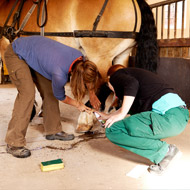BEVA launches 'Don’t Break Your Vet’ campaign

The majority of equine vets will, at some point in their career end up unconscious or hospitalised as the result of a work-related injury.
A campaign to encourage horse owners to help reduce the risks faced by equine vets has been launched by the British Equine Veterinary Association (BEVA).
The ‘Don’t Break Your Vet’ campaign comprises a series of seven video tutorials featuring vet and equine behaviourist Gemma Pearson. The videos provide quick and simple ways of teaching horses to be quiet, safe and relaxed for veterinary treatment, clipping and giving oral medications.
“Many accidents reportedly occur when vets are trying to work with horses who have learnt to avoid examination or treatment and where handlers are not in full control” says David Mountford, CEO at BEVA. “Gemma’s work at the Royal (Dick) School of Veterinary Studies and her amazing videos show how a little preparation can have a big impact on horse, owner and vet safety.”
Research shows that a significant proportion of equine vets will, at some point in their career end up unconscious or hospitalised as the result of a work-related injury. A study published in the Equine Veterinary Journal shows that an equine vet may sustain between seven and eight work-related injures that may prevent them from working during a 30-year career.
Fracture, bruising and laceration to the leg or head were the most common injuries cited by participants to the study. The main cause of injury was a kick with a hind limb. Almost a quarter of reported injuries resulted in hospital admission and seven per cent led to loss of consciousness.
The seven practical videos contain advice on how clients can prepare their horses for easy injections, learning to stand still, calm clipping and leading and trotting up. The videos also cover happy heads, clicker training and worry-free worming.
A BEVA spokesperson said: “These videos make interesting viewing for vets as well as horse owners and build on Gemma’s eBEVA webinar “Practical Equine Behaviour” and the Guidance on Managing Equine Risks that BEVA has produced.”



 RCVS Knowledge has welcomed Professor Peter Cockcroft as editor-in-chief for Veterinary Evidence.
RCVS Knowledge has welcomed Professor Peter Cockcroft as editor-in-chief for Veterinary Evidence.